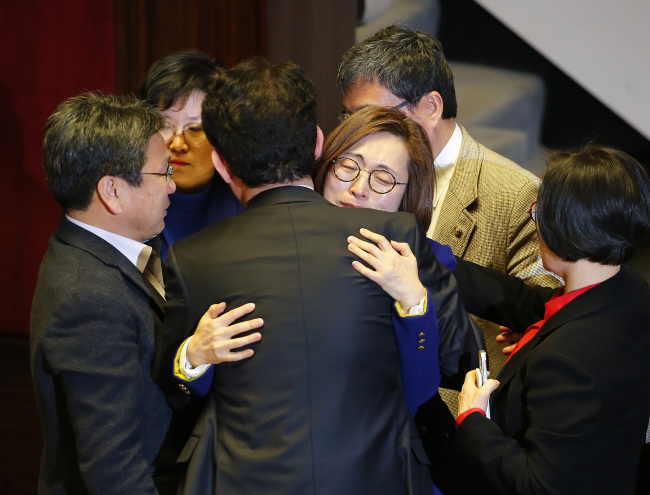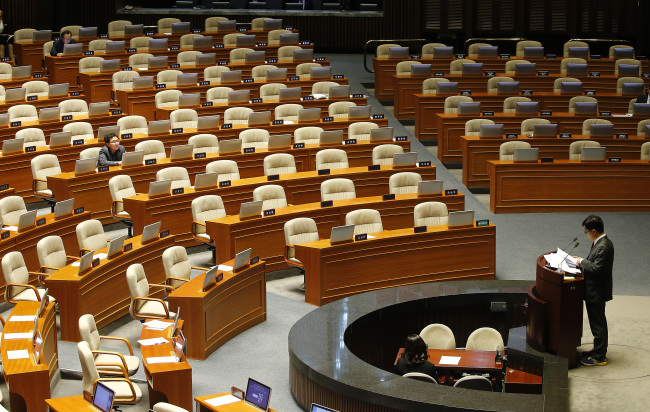A partisan standoff over the controversial counterterrorism bill continued to surge on Wednesday as opposition lawmakers scrambled to filibuster the government-led legislation that they say will undermine civil liberty by expanding intelligence agencies’ surveillance power.
In a plenary session in which a filibuster rule was first applied since its abolishment in 1973 and reinstatement in 2012, liberal lawmakers from The Minjoo Party of Korea and other minor opposition parties have taken to the podium since Tuesday evening to block the bill from reaching the floor for a vote.
The move came after National Assembly speaker Rep. Chung Ui-hwa decided to invoke his authority to bring up the bill to a plenary vote without sending it for parliamentary committees’ approval. The speaker noted that failure to pass the bill constitutes a national crisis in which he can use his power.
 |
| Teary-eyed Rep. Eun Soo-mi of The Minjoo Party of Korea is embraced by fellow lawmakers after setting the record of delivering a speech for over 10 hours at the National Assembly on Wednesday. (Yonhap) |
While the Saenuri Party asserted that the bill is crucial to prevent potential terrorism, the main opposition countered that it would grant the National Intelligence greater authority to collect financial statements and phone records of those who the agency views as terror suspects, without a warrant signed by the court.
“The filibuster is our last card in fighting the tyranny of majority by the ruling party,” said the Minjoo Party’s whip Rep. Lee Jong-kul, indicating the fact that the majority Saenuri Party, who holds 157 seats in the 293-strong Assembly, fall 19 seats short of the 176 threshold to break a filibuster.
According to the Assembly law, a filibuster can be shut off only when there is approval from three-fifths of the lawmakers attending the session, when there are no lawmakers applying for the filibuster, or when the plenary session ends on March 11 – after which the bill is required to be put to a vote in the next session.
With all of Minjoo Party’s lawmakers, totaling 108, having pledged to join the filibuster, the standoff is likely to continue until at least this Friday when the Saenuri and the Minjoo party hold a plenary session to pass a bill aimed at finalizing electoral rules for the April general election.
“Both the ruling party and the main opposition need to pass the election bill on Friday. I think they will end the filibuster and finalize the bill,” said the Saenuri Party leader Rep. Kim Moo-sung. “(In the meantime) my hands are tied. There is nothing we can do,” Kim said.
Some Saenuri lawmakers dismissed their counterparts’ participation in filibustering as a political gimmick to gain an upper hand over the nomination battle in the upcoming elections. The Saenuri whip Rep. Won Yu-chul claimed the vocal lawmakers were campaigning for their next election through their filibusters.
 |
| Most of the ruling party members‘ seats remain vacant as Rep. Park Won-suk of the minor Justice Party sets out as the fourth opposition member to deliver the marathon speech at the National Assembly on Wednesday. (Yonhap) |
President Park Geun-hye weighed in on the legislative showdown, criticizing the opposition for delaying the bill that she said would prevent the nation from terrorism, such as those from Islamic States and North Korea, amid heightened cross-border tension following Pyongyang’s nuclear test and rocket launch.
“(The filibusters) are unprecedented ones that no other countries have ever witnessed,” Park said on Wednesday at a meeting with economic policy makers. “(I don’t understand) how the economy would prosper when people live in a society where terror attacks could happen,” she said.
By Yeo Jun-suk (jasonyeo@heraldcorp.com)

